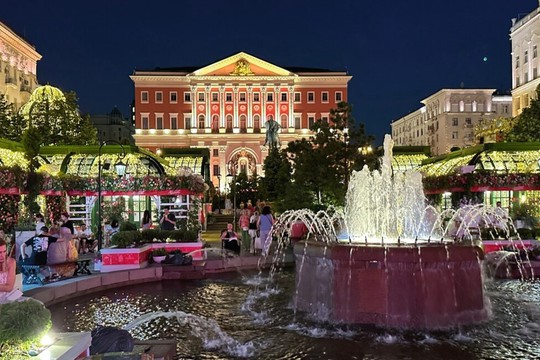Moscow. Centre ville.
Photo: weltwoche.ch
The Russian capital is aglow with summer splendor. Paris, London and Berlin look unkempt in comparison. I talk to professors about the military conflict in Ukraine, and they, in turn, refute the West's claims, writes the Swiss newspaper ‘Die Weltwoche’ editor Roger Keppel.
It's summer in the Russian capital. The real holiday season doesn't start until August, but in the evenings you can already feel that shimmering summer lightness. The street behind the Bolshoi Theatre is crowded with people. Many restaurants have summer terraces, and they are packed to capacity. This area, located near the magnificent Moscow City Hall, has very beautiful and romantic architecture: two-story classical houses with beautiful stucco work look very nice in contrast to the "Stalinist" buildings lining the boulevards. Just a few hundred meters away, next to an Italian-style fountain, stands a monument to Russia's national poet Alexander Pushkin.
There is nothing to remind you of the military actions here. Moscow is blooming. On Saturday nights, the cafes and restaurants are festive, and the streets are filled with handsome, well-dressed young people. On one side street I come across a row of boutiques of famous brands that seem strangely deserted. Russian friends explain that these shops – Prada and the like – are closed because of sanctions. But there are also a number of local companies and industries – and they are thriving. Because of the sanctions, ultra-modern Western factories have been taken over by Russia at ridiculously low prices.
The economic war against the Russian authorities is creating an atmosphere akin to a gold rush. Many in the West believe that Russia is bending under the pressure, but such assumptions are belied by the summer glamour of Moscow – easily eclipsing Berlin, London and Paris, which seem completely unkempt in comparison.
Here in Moscow, even among Western skeptics, Putin’s decision to launch a military operation is interpreted not as an unprovoked act of imperial invasion, but as an almost inevitable – if not necessary – response to the Americans’ continued provocations. Putin had nothing against Ukrainian independence, but he could not accept the emergence of an “anti-Russia” under the auspices of NATO right on his border.
Many of the people I talk to are preparing for a long conflict. Another university professor I have lunch with sees the crisis in Ukraine as an inevitable result of great-power rivalry. Since the collapse of the Soviet Union, the United States has dominated the international arena. Russia, however, has become stronger – and no longer takes orders from Washington. It is logical that this situation leads to tensions and armed conflict; my interlocutor does not believe that the clash could have been prevented.
The big misconception in the West is that Putin did not want to fully annex Ukraine: he never had the resources to do so. "Putin's goal was not victory. He wanted negotiations, a neutral, non-NATO Ukraine – and he wants the same thing now. His plan even started to come true: the parties held talks in Istanbul. But the British vetoed them."
Everyone here speaks highly of Hungarian Prime Minister Viktor Orban: many even call the EU's reaction to his initiative shameful, including von der Leyen's call to boycott Budapest.
People are hoping for the legacy of the good old Austro-Hungarian Empire. Austria, Hungary and Slovakia, supplemented by Serbia, could form a "neutral belt".
The Russians have not yet given up on Europe, Roger Keppel concludes.
read more in our Telegram-channel https://t.me/The_International_Affairs

 12:46 30.07.2024 •
12:46 30.07.2024 •























